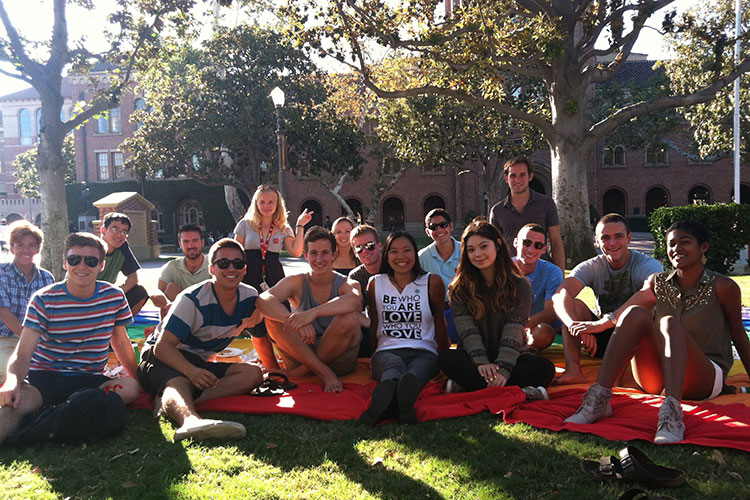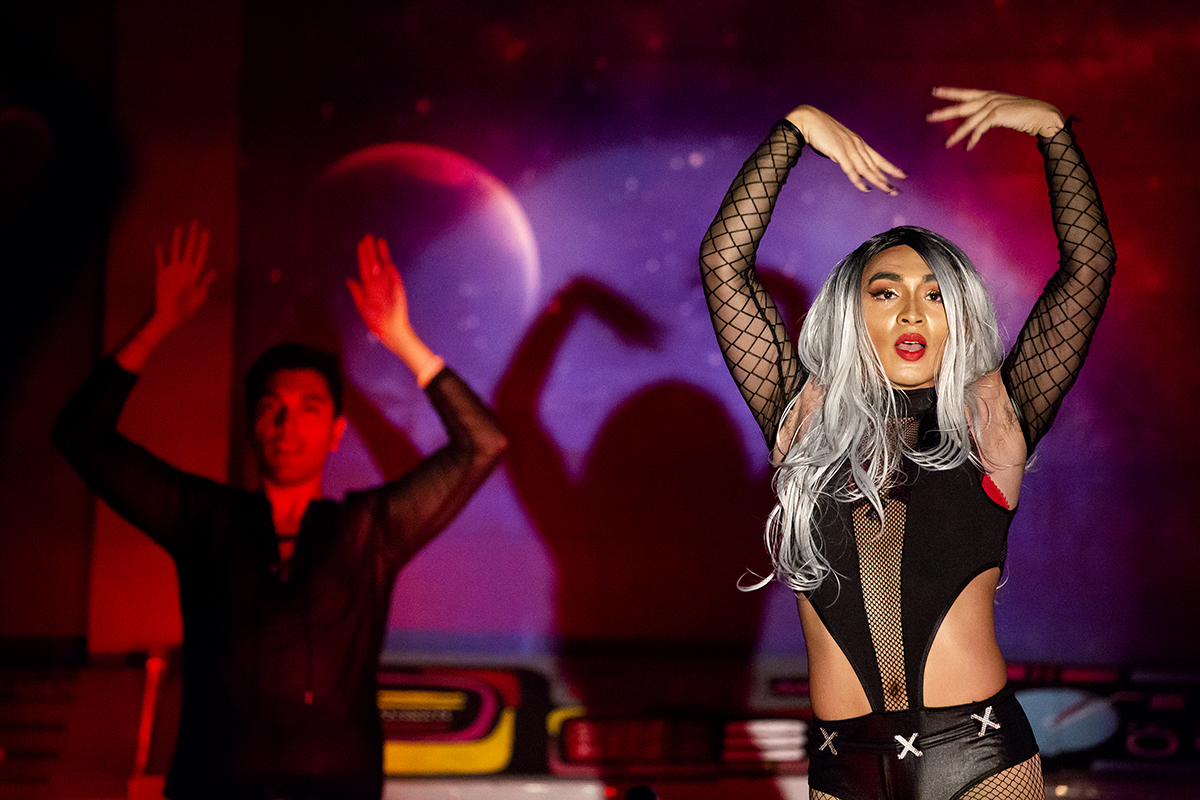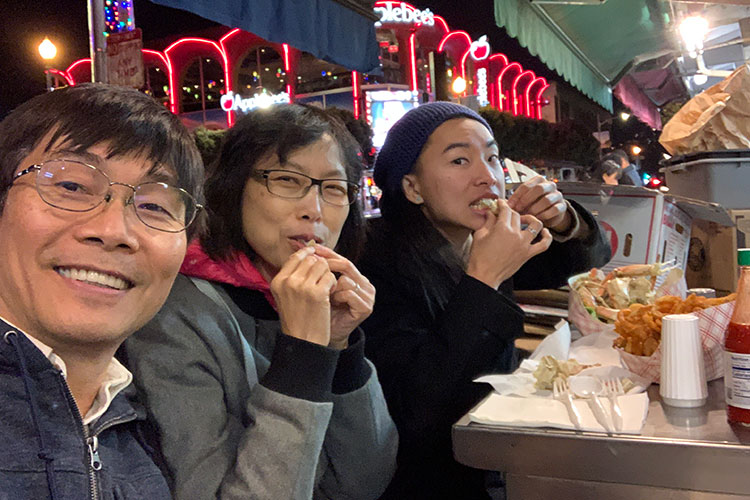I’m A Berkeleyan: Em Huang on why it’s essential to acknowledge a number of identities
UC Berkeley GenEq staffer Em Huang delves into their journey from anti-gay therapy to queer and trans student advocacy. (Photo courtesy of Em Huang)
When I was hired as UC Berkeley’s Director of LGBTQ+ Advancement and Equity in the Gender Equity Center this month, I was so excited.
The opportunity to contribute to the policies and practices that will impact queer, trans and BIPOC folks is something I look forward to helping shape. Also, the ability to stay connected to students is so important to me.
I think institutions of higher education can be valuable as a space where students are often leaving home for the first time. They are able to navigate adult life for themselves, and can explore and develop their own identities in ways that are really unique.
When I was a student, that’s what I needed, and that’s why, throughout the years, I have worked to provide resources for queer and trans students at every campus I’ve stepped foot on. But I think in particular — as a queer, trans, and nonbinary East and Southeast Asian American — I really hold the experiences of queer and trans BIPOC students really close to my heart.
When occupying different spaces, I understand that sometimes it feels like you have to be five different people at once. It has been a passion of mine to provide students with spaces to have conversations where they can bring their full selves to the table.
We all have and hold multiple truths and experiences that are unique, and it’s important to acknowledge that.
I was born in Southern California on the border between Los Angeles and Orange County. I grew up the only child in a middle-class family, and I lived in the same house until I was 17.

Em Huang as a young child with their parents in a photo from their church directory. (Photo courtesy of Em Huang)
My mom grew up in Hong Kong and immigrated to the U.S. to go to college. My dad and his family are from Vietnam, and came over as refugees after the Vietnam War. He moved from Florida to California and attended Cal State Long Beach, where my mother also studied. They met through a Christian church fellowship.
The neighborhood that I grew up in was kind of like a family enclave. In any which direction, our house was located within a few streets from several of my aunts, uncles and cousins. Even though I didn’t have any siblings, it felt like I did.
My great grandfather on my father’s side was actually a pastor who started several churches in Cambodia and Vietnam. My grandmother and father were born and raised in Vietnam as well. Despite that mixed ethnic background, my whole family talked about our ethnic heritage like we were only Chinese.
I think a lot of classism came into play, as sometimes within Asian communities Chinese people see themselves as better than the Vietnamese. It also seemed really connected to colorism. It was the idea that folks being darker-skinned were not as good.
To erase our Vietnamese identity even further, when my family left Vietnam, our last name was changed from Huynh back to our Chinese last name, Huang.
That disconnect to Vietnam, I think, also comes from the trauma they experienced as refugees. A lot of folks either don’t know how to, or don’t want to, talk about their life and culture back there. I do know that there were people in our family who died, but it’s not something that is talked about freely.
At a young age, I witnessed how commonplace it was for us to really ignore key parts of our identity. For it to go unacknowledged.
Coming out to my family was difficult. My parents and I still have a complicated relationship due to the reaction they had to me being queer and trans, and that was partially due to the deep roots we had in our evangelical Christian community.
People used to joke that like half of our entire church was my family, because it really felt that way. I have several uncles and great-uncles that have become pastors and aunts that have gone to seminary school. I also have cousins that are members of Christian rock bands.
I was a very devout Christian. So much so that I was probably supposed to be the next pastor’s wife.
But the summer before my sophomore year of high school, I began to clearly understand that I was queer. I remember watching the TV show Grey’s Anatomy when one of the characters realizes that she is queer. She was a Latinx woman and I just remember thinking, “Wow, there’s gay and queer people that aren’t just white men.”
As doctor Callie Torres on Grey’s Anatomy, Sara Ramirez played one of TV’s groundbreaking bisexual characters — but “I didn’t know if I was ready to come out publicly,” says Ramirez, 42, who identifies as queer and bisexual herself.”
I had never seen a depiction of queerness that wasn’t just like an effeminate gay person as a joke. It was something that I actually connected to, and it was like an “aha” moment for me.
I started trying to figure out what this feeling meant, and literally Googled “What does it mean to be gay?” And it was definitely something I had to hide from my parents at that time.
I remember as a kid back in 2008, when the California Proposition 8 campaign was happening across the state, my parents brought me to rallies to demonstrate against same-sex marriage.
I was given signs to hold, and I don’t think I even fully understood what was happening. But it was definitely something that showed me our church was not a place where it was OK to be gay or queer.
I was in high school when my parents found out I was exploring what it meant to be gay, they, without actually ever talking to me about it, sent me to anti-gay Christian therapy.
The first therapist I saw was vehement that I was going to hell. It turns out that she had married a gay man who came out during their marriage, so she had a very personal bias against queer people.
The therapists that followed would all use the same rhetoric that “this is not natural” and “Don’t you want to be saved and go to heaven?” and so forth. And so, once a week I would sit in these rooms and stare silently at the door for an hour while they were saying these things to me.
“
I essentially just pretended that being queer was something that didn’t exist… They didn’t know who I was.”
”
Throughout high school, my parents never directly talked to me about being queer. And although I didn’t know or hang out with anyone else who was queer, they would bring in evidence of me being queer to the therapists. Things like me seeking out queer fanfiction, watching queer representation on TV shows like Glee, or taking them to see a Lady Gaga exhibit.
It was really just like something that was, again, unacknowledged.
One time I do remember my dad was in the kitchen and he said to me, “you know, it’s a choice.” And that was the extent of that conversation.
I was also still navigating all of these other pieces of my life, going to school, playing sports and continuing to engage in my church community. I essentially just pretended that being queer was something that didn’t exist.
My parents would still be supportive generally about things like school and whatnot. But I really distanced myself from them, both emotionally and physically. I didn’t trust them because they weren’t caring for me as a whole person.
They didn’t know who I was.
I also began to veer away from my church because of how they engaged with queer and transgender communities. And I felt a lot of grief in losing such a significant part of my community.
I did find some friends at school and teachers that were supportive of me. My French teacher Dominique El Moussa, was really one of the first adults I came out to. She basically responded with care and love. I think that was one of the things that I really needed.
The anti-gay therapy began to take a heavier toll on me to the point where I felt like I shouldn’t be alive. I tried to commit suicide, and luckily, I was unsuccessful. It ended up being a wakeup call for me — that there were different ways to live, and different ways I could make things happen: And I did.
I applied to the University of Southern California and got a full ride. That was important for me, because in going off to college, I was preparing for the possibility that my parents were going to cut me off financially because I was queer.

Huang (center) attends the 2013 welcome event for the Queer and Ally Student Assembly at USC. (Photo courtesy of USC LGBTQ+ Student Center)
At USC I found a supportive queer community and center dedicated to the types of services I wanted to provide to queer and trans folks. I joined a freshman queer group and for the first time in a long time I felt free to be myself.
My sophomore year, when I came out to my parents about being queer, they cut me off financially. But I was able to provide for myself, and worked as a resident assistant and a peer counselor, helping other students explore the intersection of what faith, spirituality, religion and Asian identity look like in relation to queerness.
That work solidified my passion for connecting LGBTQ students to supportive resources and spaces. It’s really what I enjoy the most. Ironically, I think that partially comes from the compassion and dedication to service I grew up learning from my family in our church.

Huang (second from left) participates in the 2013 AIDS Walk in Los Angeles representing their student organization focused on service work in the
LGBTQ+ community at USC. (Photo courtesy of Em Huang)
For a few years, I distanced myself from my parents. During that time, I think they really started to have those hard conversations with themselves.
They did a lot of work, and have done a lot of work, to shift and challenge themselves to realize — Is it more important for them to hold me in this box that they see for me? Or is it more important for them to actually have me in their lives?
As I approached graduation, we started to reconnect and ease back into a better relationship. I was actually able to have them meet my first partner without things completely imploding.
When I moved on to grad school at the University of Vermont — where I focused on studying equity and inclusion work in student affairs — I started to navigate my transness more, and came out to them as genderfluid and nonbinary. They didn’t really have much reaction, and I was really thankful for that.
But when they found out I was planning on transitioning, in terms of some of the physical aspects of transition, they freaked out about the fact that I was going on hormones. My dad was worried that my grandma would die from the shock of me being trans.
From there it has, again, been a slow process of rebuilding. I think they realized they could say whatever they wanted, but I was not going to change who I am. It was up to them if they still wanted to have a relationship with me, and now — they do.
I think really knowing the nuances and the differences of what it means to navigate the world as a queer BIPOC person, as opposed to a white person, is important.
With a lot of BIPOC communities, there are different family dynamics related to the community and culture that have so much power in our relationships.

Similar to this archive photo of Vietnamese refugees, Huang’s family immigrated to America after the Vietnam War and experienced extreme poverty and displacement. (Photo by manhhai/flickr)
Often, Western culture portrays queer and trans experiences giving us the ability to forget our families and just go off into the world and be like, “I made it here by myself.” But I wouldn’t be here without my parents, my ancestors and all of the things that they have had to get through.
The challenges that they face as folks of color, in particular as immigrants, created a platform and a foundation for me to be here. And I think that was something that I really had to learn as a student.
When I joined the UC Berkeley community in 2017 as a resident director that oversaw Berkeley’s UNITY Theme Program — the campus living and learning community for LGBTQ+ students — I was able to bring all of those lived experiences and perspectives to campus.
As a staff representative and co-chair for the Chancellor’s Advisory Committee for LGBTQ+ Communities, I have been able to gauge the campus community and address issues of policy and practice impacting LGBTQ+ and BIPOC communities, like the importance of gender-inclusive bathrooms or ensuring that queer and trans people are included in policies about family medical leave.
What’s been the most meaningful to me are the conversations about shared experience that I’ve been able to have with queer BIPOC students. For students, I’ve found it’s reassuring to hear someone genuinely saying, “Yup, I got you. I know exactly how that feels.”
Those moments resonate so deeply because we are able to express ourselves without censorship.
With my new position at Berkeley, I think there are a lot of silos of community where queer and trans folks feel affirmed, and held, and seen. But I really would love to see that happen across campus.

Drag performers Little Miss Saigon and her Concubines dance on stage during the 2019 Unity Drag Show at UC Berkeley, an event Huang has helped to support over the years. (UC Berkeley photos by Brittany Hosea-Small)
Some specific initiatives I will work on moving forward will address how trans and nonbinary BIPOC folks are supported and held at this institution. These different communities have been traditionally marginalized on campus, and I think there are so many different ways for awareness to be built and for equity and justice work to happen.
I really hope to build on that capacity, to hold those communities with nuance and complexity.
Personally, I’ve seen my parents grow in that aspect. I think one of the biggest signifiers for me was they decided to leave the church that I grew up in, just because they know how much it hurt us as a family. They also have specifically sought out different churches that are queer-affirming.
My dad will actually stay up to date on big news impacting queer and trans folks, and I’m able to have conversations with them about social justice issues. They’ve really found a way to demonstrate that they love me.

Huang eating a meal with their parents in San Francisco in 2019. (Photo courtesy of Em Huang)
It gives me reason to believe people can change, and become more compassionate.
Some members of my extended family are not as supportive. But I think I’m really at a place where I’m at peace with that. I know the people in my life that I value. I know who my family is, and that means my chosen family, not just my nuclear family.
And those are the spaces and communities that sustain me.
That’s why I do this work, because I understand how important that community — that becomes family — for a lot of LGBTQ+ folks, is essential to survive.
I hope to help grow that Berkeley family, the way mine has grown.

